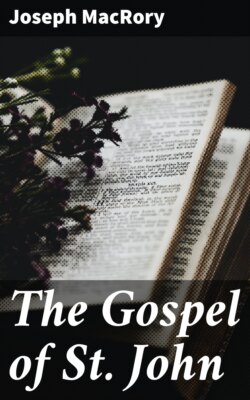Читать книгу The Gospel of St. John - Joseph MacRory - Страница 16
На сайте Литреса книга снята с продажи.
IX.—Errors Combated In The Gospel.
ОглавлениеTable of Contents
There is not one of all the many heresies that have arisen regarding the Person and natures of Jesus Christ that may not be refuted from the Gospel of St. John. We intend, however, to speak here only of those errors which had already arisen in the time of the Evangelist, and against which, therefore, his Gospel was immediately directed. What these were we learn from SS. Irenæus and Jerome. The former distinctly says that our Gospel was directed against the errors of Cerinthus, and of “those who are called Nicolaites” (see above, III. 2, note); while the latter says that it was directed against Cerinthus, and other heretics, especially the Ebionites.13 It is important for us, then, in approaching the study of this Gospel to understand what was the nature of these errors against which it was directed.
Cerinthus, though professing belief in a Supreme Being, held that the world was not made by Him, but by an inferior power (virtus) distinct from Him, and ignorant of Him. (2) That Jesus was not born of a Virgin, but the child of Joseph and Mary, born according to the ordinary course of nature. (3) That Christ (the Word) was quite distinct from Jesus; that, however, He had descended upon Jesus immediately after the latter's baptism, and remained with Him filling His soul till shortly before the Passion; that then Christ departed from Jesus, who suffered and died a mere man, [pg 011] while Christ suffered nothing, being indeed entirely spiritual and impassible.14
The Ebionites, unlike the Cerinthians, admitted that the world was created by God, but, like them, denied that Christ was anything but a mere man. They scrupulously observed the Mosaic Law, which they held to be obligatory, by the observance of which Jesus had merited to be called Christ, and through which every man was able to become a Christ.15
About the doctrine of the Nicolaites, which they claimed to have derived from Nicolas the Deacon (Acts vi. 5), we know nothing definite; but it is generally held that it was akin to that of the Cerinthians and Ebionites.
Among the “other heretics” alluded to by St. Jerome in the passage cited above were, doubtless, the Simonians (followers of Simon Magus, Acts viii. 9, and foll.), and the Docetae.
The Simonians agreed with the Cerinthians in denying that the world was made by God, and that Jesus was God, and St. Irenæus speaks of them as the originators of the Gnostic heresy. “Simoniani a quibus falsi nominis scientia accepit initia.” (Adv. Haer., i. xxxiii. 4.)
The Docetae (δοκεῖν = to seem) held that Christ had only the appearance of a human body; and hence, that His sufferings and death were not real, but apparent.
[pg 013]
